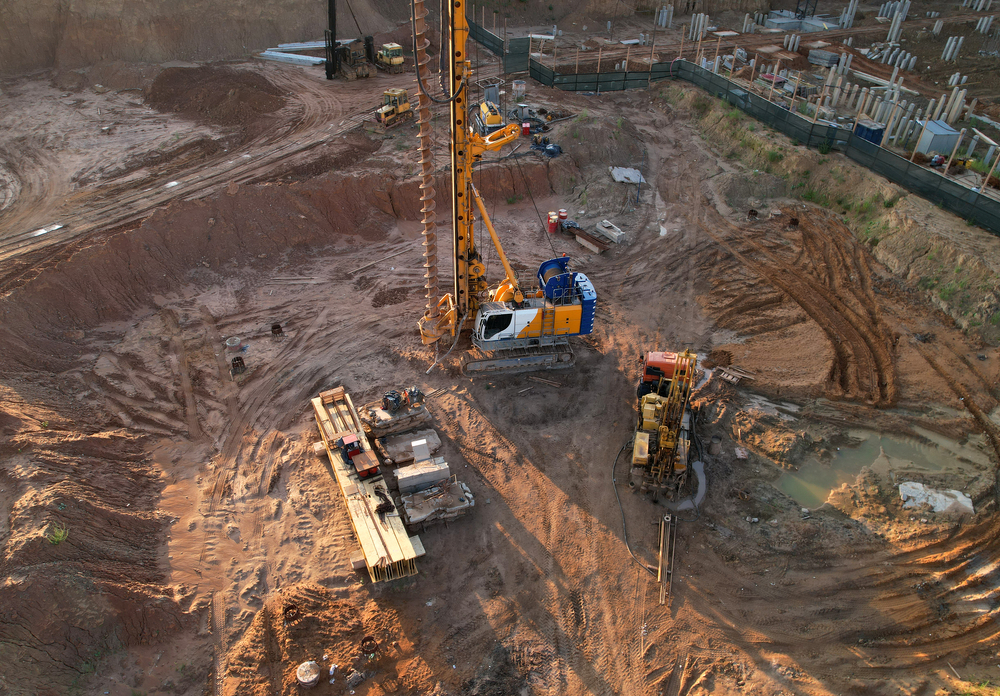Getting My Geotheta To Work
Getting My Geotheta To Work
Blog Article
An Unbiased View of Geotheta
Table of ContentsThe Ultimate Guide To GeothetaGetting My Geotheta To WorkGeotheta Fundamentals ExplainedGetting The Geotheta To WorkUnknown Facts About Geotheta

They perform site investigations, gather samples, execute research laboratory examinations, and analyze information to assess the viability of the ground for construction projects - Geotechnical Engineers. Based on their searchings for, geotechnical engineers provide suggestions for structure style, slope stability, preserving frameworks, and mitigation of geotechnical dangers. They work together with other experts, such as architects, architectural engineers, and construction groups, to guarantee that geotechnical considerations are incorporated right into the general project design and implementation
By evaluating the behavior and residential or commercial properties of dirt and rock, they can recognize potential geotechnical risks such as landslides, soil negotiation, or slope instability. Their expertise helps avoid failures or mishaps that can jeopardize lives and home. Here are some comprehensive tasks and responsibilities of a geotechnical engineer: Site Investigation: Geotechnical designers conduct site investigations to gather information on subsurface conditions.
They interpret the data to recognize the residential or commercial properties and actions of the soil and rock, including their toughness, leaks in the structure, compaction qualities, and groundwater conditions. Geotechnical Analysis and Layout: Geotechnical engineers evaluate the information collected during website examinations to evaluate the stability and suitability of the site for building and construction jobs. They perform geotechnical estimations and modeling to assess variables such as birthing capability, settlement, slope stability, side earth pressures, and groundwater flow.
All About Geotheta
Structure Style: Geotechnical engineers play an important duty in designing structures that can securely sustain the designated structure. They evaluate the soil conditions and tons needs to establish the proper foundation kind, such as shallow foundations (e.g., grounds), deep foundations (e.g (https://disqus.com/by/geotheta/about/)., heaps), or specialized strategies like soil enhancement. They think about aspects such as negotiation limitations, bearing capacity, and soil-structure interaction to establish ideal structure styles
They examine building plans, display site activities, and perform area evaluations to validate that the style referrals are adhered to. If unexpected geotechnical concerns emerge, they examine the situation and give suggestions for removal or modifications to the design. Risk Analysis and Mitigation: Geotechnical designers examine geotechnical risks and risks connected with the project site, such as landslides, liquefaction, or soil erosion.

Partnership and Communication: Geotechnical designers work very closely with other experts associated with a job, such as engineers, architectural designers, and construction groups. Efficient communication and collaboration are vital to integrate geotechnical factors to consider into the overall task style and building and construction procedure. Geotechnical designers provide technological competence, response inquiries, and ensure that geotechnical requirements are satisfied.
Not known Facts About Geotheta
Below are some kinds of geotechnical engineers: Foundation Engineer: Foundation engineers concentrate on designing and examining foundations for frameworks. They assess the soil problems, load requirements, and site features to identify the most proper foundation type and design, such as superficial structures, deep foundations, or specialized strategies like pile foundations.
They review the aspects influencing incline stability, such as dirt buildings, groundwater conditions, and incline geometry, and develop methods to stop incline failings and alleviate threats. Earthquake Designer: Quake designers concentrate on analyzing and creating frameworks to endure seismic forces. They evaluate the seismic hazard of a website, examine dirt liquefaction potential, and develop seismic layout criteria to make sure the security and durability of structures throughout earthquakes.
They carry out field testing, gather samples, and analyze the gathered data to define the soil homes, geologic developments, and groundwater problems at a website. Geotechnical Instrumentation Designer: Geotechnical instrumentation designers focus on tracking and measuring the behavior of dirt, rock, and structures. They set up and preserve instrumentation systems that monitor factors such as dirt negotiation, groundwater levels, incline movements, and structural variations to analyze performance and offer early cautions of prospective issues.
The Best Strategy To Use For Geotheta
They perform tests such as triaxial examinations, consolidation tests, direct shear examinations, and leaks in the structure tests to gather information for geotechnical evaluation and style. Geosynthetics Designer: Geosynthetics engineers focus on the design and application of geosynthetic materials, such as geotextiles, geogrids, and geomembranes. They make use of these materials to improve soil security, enhance slopes, give water drainage services, and control disintegration.
They tend to be investigatory people, which implies they're intellectual, introspective, and inquisitive. They are curious, systematic, rational, analytical, and sensible. Some of them are additionally social, meaning they're kind, charitable, participating, person, caring, valuable, compassionate, skillful, and friendly - Geo Tech Engineering.
In the office atmosphere, you can find out more geotechnical engineers utilize specialized software devices to do computations, produce layouts, and examine data. They prepare reports, review task specs, communicate with clients and employee, and coordinate task tasks. The workplace setting offers a helpful setting for study, evaluation, and collaboration with various other experts involved in the task.
Excitement About Geotheta
They often check out job websites to conduct website examinations, analyze geotechnical conditions, and gather data for evaluation. These visits include taking a trip to various locations, occasionally in remote or difficult terrains. Geotechnical designers might carry out dirt sampling, conduct examinations, and monitor building and construction activities to ensure that the geotechnical facets of the project are being executed correctly.
Geotechnical designers likewise work in specialized geotechnical laboratories. Geotechnical lab designers work thoroughly in these atmospheres, managing screening equipment, running tools, and videotaping data.
Report this page